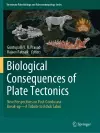
Biological Consequences of Plate Tectonics
2 contributors - Paperback
£105.50
Dr. Guntupalli V.R. Prasad received his Ph.D. from Panjab University, Chandigarh in the year 1986. He is a former Professor at the University of Jammu and Indian Institute of Science Education & Research (Kolkata). He is presently a Professor in the Department of Geology, University of Delhi, India. Prof. Prasad has more than 34 years teaching experience at Graduate and undergraduate level. A vertebrate paleontologist by training, he has been working for the last three and half decades on the evolution of Mesozoic vertebrates of India using form and function of vertebrate fossils. Prasad’s research has focused primarily on biodiversity changes during the time span of Deccan volcanismwhich brought many new species of fishes, amphibians, reptiles and mammals to light and also provided paleontological constraints on the age of initiation and duration of Deccan Volcanism. His research has also thrown light on faunal dispersals and biogeographic linkages between the physically isolated and rapidly northward drifting Indian plate and other landmasses. Dr. Prasad’s findings of diverse mammalian groups from the Jurassic and Cretaceous of India have firmly placed India on Mesozoic mammalian map of the world. Author of more than 100 scientific papers published in leading journals in his field of specialization as well as high impact journals like Nature, Science, Nature Communications, and Proceedings of National Academy of Sciences, Prof. Prasad received Shanti Swarup Bhatnagar Prize, India’s highest science award, for his outstanding contributions in the field Vertebrate Paleontology. Other recognitions received by Prof. Prasad include J.C.Bose National Fellowship, National Geoscience Award, L. Rama Rao Birth Centenary Award, and National Award in Geosciences & Technology. He has been honored with the Fellowship of the Indian National Science Academy (FNA), Indian Academy of Sciences (FASc.), National Academy of Sciences (FNASc.), and Academy of Sciences for the Developing World (TWAS).
Dr. Rajeev Patnaik did his Ph.D at Panjab University, Chandigarh and Post-Doctoral fellowships at Paläontologische Museum München, Ludwig-Maximilians-Universität, Germany and Institut des Sciences de l'Evolution de Montpellier, France. By integrating aspects of stable isotopes, microwear, morphometrics, cladistics and enamel microstructure, he has been able to contribute towards the understanding of diet and evolution of some Indian fossil mammals such as murine rodents and primate/hominins. He has also worked on the impact of climate change, palaeoecology, palaeobiogeography and geological context of Indian Neogene mammals with particular focus on the hominoids. He and his colleagues discovered new hominoids/primates, ostrich-like eggshells, new pelican and darter fossils from the Siwaliks (subhimalaya); Late Cretaceous rice from central India; and Miocene mammals from the Baripada Beds of Odisha. He has published over 100 research papers in reputed journals and has served as Associate Editor for scholarly journals such as Journal of Human Evolution, Current Science and Journal of the Geological Society of India. In 2016 he was awarded the prestigious National Geoscience Award by the Honourable President of India and in 2019 was elected as a Fellow of the Indian Academy of Sciences.